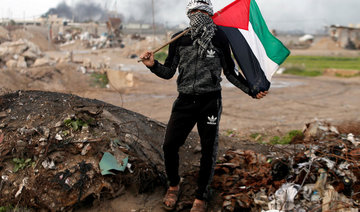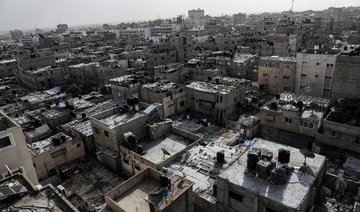GAZA CITY: The Palestinian government has cut the electricity supply lines to six health centers in the Gaza Strip in a desperate effort to combat a chronic fuel shortage facing the occupied territory’s clinics and hospitals.
Officials in the coastal enclave have portrayed the move as a last ditch attempt to avert a “severe crisis” from crippling Gaza’s health system eleven years after Israel imposed a devastating land, air and sea blockade on the area.
But the blackout has also underlined continued divisions between rival Palestinian factions who blame each other for a funding gap of more than $290,000 in the health service’s budget. While Hamas claims not to have received the money, the Palestinian Authority in the occupied West Bank insists it has been allocated but is not being spent properly.
Dr. Ashraf Al-Qidra, a spokesman for the Ministry of Health in Gaza, warned that the fuel shortage was expected to get significantly worse if the problems continued.
“We are concerned that more [generators] will stop every day because there is no horizon to this severe crisis,” he said.
Approximately 1.9 million people, including 1.3 million refugees, are estimated to live in Gaza and roughly 80 percent of the population is dependent on international assistance, according to the UN.
While the main hospitals in the area are still functioning, the Ministry of Health decided on Monday to shut down the electricity generators supplying six health centers — bringing to 19 the total number of hospitals and clinics now without power as a result of “severe austerity measures.”
Gaza remains under the control of Hamas, which took power in 2007 after winning legislative elections a year earlier. Its victory led to a bitter dispute with Fatah that only ended last autumn, when the two sides agreed to a reconciliation deal after talks brokered by Egypt.
But the agreement has yet to be fully implemented and the Palestinian Minister of Health, Dr. Jawad Awad, has accused Hamas of contributing to the crisis in Gaza by mismanaging its resources. Based in the occupied West Bank, he told state radio that his ministry had fulfilled its funding obligations — a claim rejected by Al-Qidra.
Blackouts and load-shedding have long been common in Gaza, with electricity often limited to just a few hours every day for the general population.
The Ministry of Health in Gaza says it needs 40,000 liters of diesel every month in order for its hospitals and clinics to receive 12 hours of electricity per day. It currently appears to be far short of this target.
Gaza is already in the grip of a severe economic crisis that has decimated the private sector. Last month businesses throughout the area staged a mass strike in protest against conditions and announced they would stop receiving goods through the remaining commercial border crossing to Israel at Kerem Shalom.
Even the Israeli president, Reuven Rivlin, has warned that Gaza’s infrastructure is on the verge of total collapse.
Maher Al-Tabaa, director of public relations at the Chamber of Commerce in Gaza, described the economic situation as a “clinical death.”
“We seek to send a message to all parties — from the factions, the government, international organizations and the international community that we cannot live in Gaza if the situation continues as it is,” he told the Arab News.
Health services in Gaza crippled by fuel shortage
Health services in Gaza crippled by fuel shortage














